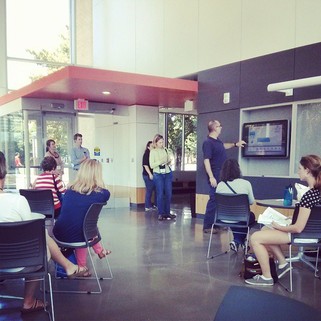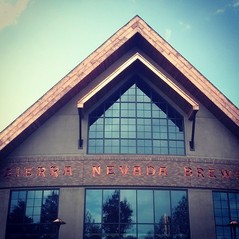 Tour stop at UNC's Asheville Campus to learn about sustainable buildings. Tour stop at UNC's Asheville Campus to learn about sustainable buildings. In September, I attended the Water Education Summit in Asheville, NC. The Summit is a gathering of water resources professionals from across the southeastern USA. This was my second year attending and I grow to love this conference more every time I do! The Summit is held in a different southeastern state every year and this year was in Asheville, North Carolina; last year, 2013, was in Chattanooga, Tennessee. Chattanooga and Asheville have something in common besides complex water resource issues though; a passion for local food and sustainable growth management. I really loved Asheville; I'm surprised I've never visited before! The summit featured a wonderful poster session and some truly inspiring speakers but my favorite part was the abstract sessions. Abstract sessions, in case you don't know what I'm talking about, are sort of like speed dating for ideas and programming. You shuffle between topic-focused rooms to catch 10-15 minutes presentations which summarize an event, program, or idea from another organization or educator. The Water Education Summit featured several interesting topics but my favorite presentation came out of North Carolina Cooperative Extension and featured, "Innovative Stormwater Floating Islands as Wetland Plant Nurseries." The basic idea being that we can create small floating gardens for wetland species and get the benefit of new plants and nutrient reduction. These plants, at the end of the season, can be given away to residents who are interested in re-vegetating their lakefront or wetland area.  A brewery trimmed in copper. A brewery trimmed in copper. The crown jewel of the field day (day 2) was a tour of the new Sierra Nevada Brewery complex just outside of the Asheville Regional airport. The brewery really was impressive and smelled amazing due to the brewing process. In addition to being sustainable brewers, Sierra Nevada captures all the rainfall that lands on the Asheville structure and stores it underground in a massive cistern for use in the complex's toilets. There aren't many employees to use all that water but soon they are opening a brewery restaurant and a gift shop for the public. At which point, I imagine the rainfall collection will go a long way to reducing their use of potable water and thereby, reducing their impact on the water resources around them.  Roast duck breast with truffled foie gras risotto, at Isla's Bistro. Roast duck breast with truffled foie gras risotto, at Isla's Bistro. One of my favorite parts of the Water Education Summit is that evenings are to yourself; giving you at least two evenings to explore the city in which the Summit is hosted. Both Chattanooga and Asheville are fantastic cities with loads of personality and flare. In Asheville, I was astounded at the number of small craft breweries found in downtown and overwhelmed by the number of highly rated restaurants within walking distance. As an occasional home-brewer, it was incredibly interesting to see the culture of micro-breweries sprinkled all over town. Some are open only two nights a week and feature a handful of micro-batches while others are open 7 days a week and have full dinner service.
Comments are closed.
|
The
|



 RSS Feed
RSS Feed
